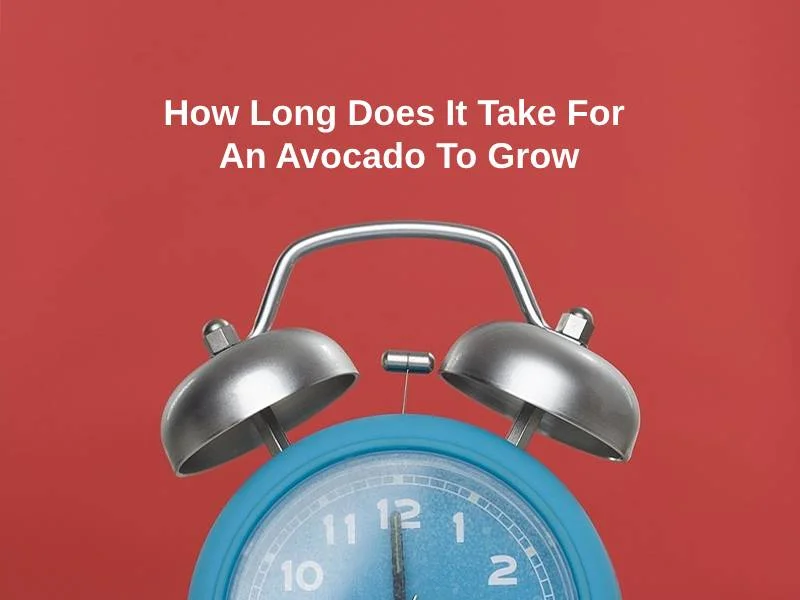Exact Answer: 5 to 13 Years
Avocado fruit takes approximately nine months to grow from a blossom to edible fruit. But, it will take around 5 to 13 years to develop and bear fruit.
It is a light green color fruit with a large seed and has dark leathery skin outside. It is every Chef’s favorite. Also, it is a go-to element, a substitute for mayo, guacamole, and sandwiches. They are a showcasing element in different dishes and sides, starting from wraps and salads to smoothies.

How Long Does It Take For An Avocado To Grow?
| Most Common Types Of Avocado | Duration of Growth/Ripening |
| Mexican | 6 to 8 Months After Flowering |
| Guatemalan | 9 to 12 Months After Flowering |
| West Indian | Up to 9 Months From Flowering |
If anyone wishes to grow an avocado tree by sowing seed or an avocado pit, it will take about 10 to 15 years to bear any fruit. Factors influencing the growth are the variety of the avocado and the environmental conditions. One can purchase a plant instead of sowing a seed that will bear fruits faster. These saplings or plants bear fruit in very little time, about three years. They are from grafts taken out of mature trees. Certain conditions need to meet to grow healthy avocados.
Avocado trees flourish well in grainy and sandy soil. The soil must have a high saline level and should have enough iron content. These trees must be grown under the sun instead of shade. If grown under the shade, the tree might not be competent in bearing fruit. Heavy wind can also damage the foliage, which might not be best for the tree’s health.
Avocado trees need enough water to have them wet and not excessive to damage them. Excessive amounts of water can cause the tree to perish.
Pruning might not be necessary. But, if someone wants to have the tree trimmed, one should be cautious enough to not over-prune it. Over-pruning might prevent the means of fruit production.
The ideal temperature given to an avocado tree must be within 70 to 100 degrees. A temperature that does not meet this range might harm fruit production.
The avocado tree requires to be fertilized six times for three years each. After that, one can use the fertilizer four times.
Why Does It Take That Long For An Avocado To Grow?
Avocado trees take 3 to 4 years to bear fruit when settled as a sapling from a nursery. But, it can take 5 to 13 years to start bearing fruit when planted from seed. Most yield fruits for months but, if some of them are on the tree unplucked, they can harvest in all the seasons. Avocado trees do not bear fruit each year but, in the least, in the first few years, they will not be prepared enough to hold fruits.
Even if the young trees do bear fruit, they might not be edible or in a very little quantity. Also, the obstacles like excessive pruning and excessive fertilization can prevent fruiting on the tree by a year or longer. In any circumstances, one might see something called biennial bearing or an alternate bearing in their avocado trees. That means they will flower and bear fruits limited to every other year. Usually, this occurs following a year of very excessive fruit production.
Typically, the tree has consumed its reserves by using its nutrients to provide a big harvest. The tree will then take a year to recover its vitality and prepare for production the following year. One might be able to withdraw biennial bearing by reducing the flowers and fruit during heavy years.
Conclusion
Avocados undergo hand-held poles and basket harvesting methods. Fruits are plucked when ripe but are still hard to consume. Concluding when to harvest avocados is quite complicated and might need experience. A small change in the skin color, losing its glossiness, or a light brown seed coat indicates maturity. Pruning shears can be of use for harvesting avocados. The pedicel must stay attached to the avocado fruit.
The fruits are left to ripen in the tree. Softening of the fruit symbolizes ripeness. Determination of the ripeness of a variety that is thick-skinned might be tricky for the inexperienced. Plucking the fruits too early might lead them to fail to ripen and shrink. Fruits of some exceptional cultivars might be refrigerated for numerous days after ripening without any damage to them.